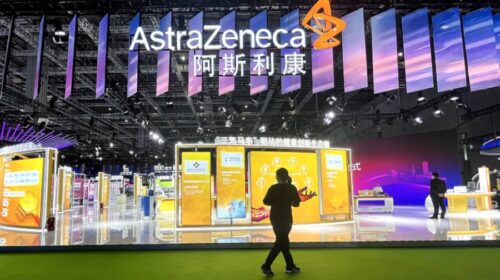One-Trick Pony Boan Biotech Files for Hong Kong IPO Into Tough Market

The biotech company is awaiting approval on a second drug to drive up revenue as it firms its foothold in a competitive landscape
Key Takeaways:
- Boan Biotechnology sells only one product so far and is facing stiff competition from other similar drugs
- Luye Pharma bought Boan in 2020 and is taking it public at a time when markets are bearish
By Molly Wen
Shandong Boan Biotechnology Co. Ltd. recently filed for an IPOon the Hong Kong Stock Exchange to raise cash to boost drug development, marketing and research. Hong Kong-listed Luye Pharma Group (2186.HK)’s, which is Boan’s parent, expects to raise up to $200 million from the IPO, according to media reports. Founded in 2013, Boan has one product called Boyounuo, which is a bevacizumab injection – a biosimilar to the drug Avastin from Roche Pharma (RHHBY.US) used to target cancer-related indications.
With two drugs still in phase 3 trials and approval expected for another soon, Boan is still a one-trick pony. Boyounuo, which was launched in May 2021, brought in revenue of 159 million yuan ($23.8 million) in eight months (May to December) of last year. Boan recorded a loss of 225.4 million yuan as costs to commercialize the drug swelled.
The company has nearly a dozen drugs in various stages of testing. Parent Luye will still own more than 80% of Boan after the IPO, whose joint sponsors include UBS and Essence International.
Eager to launch a second product
Boan hopes to unveil a second drug, a denosumab biosimilar used to treat osteoporosis in women undergoing menopause. An approval is expected in the second half of 2022, with the drug having the potential to become the first denosumab biosimilar available in the Chinese market and a new revenue driver for the company.
Boan also has its hands in developing antibodies to fight Covid-19. It has developed a neutralizing antibody called LY-CovMab, which it calls “our core product.” Phase 2 clinical trials of LY-CovMab are currently underway in China. Boan says LY-CovMab “could be a promising antibody,” with the possibility of sales in overseas markets.
Boan’s one and only cash cow bevacizumab, an anticancer medication, is used for treating multiple malignant tumors. While the market for bevacizumab in China is expected to grow in double digits (11.8%) from 5.8 billion yuan in 2020 to 17.9 billion yuan in 2030, the landscape is competitive. Nine bevacizumab drugs are sold in China, including a drug owned by Roche Pharmaand eight Chinese biosimilars.Six of them were approved by Chinese authorities in 2021. Boan’s competitors include established firms like Jiangsu Hengrui Pharmaceuticals (600276.SH), Bio-Thera Solutions (688177.SH) and Betta Pharmaceuticals (300558.SZ), all of which have sophisticated sales networks.
One worrying sign for Boan is its reliance on a limited number of distributors. The company’s top five distributors accounted for more than a fourth of sales in 2021. But Boan is expanding its sales and distribution network. It granted exclusive promotion rights of its drugs to AstraZeneca (AZN.L) in 21 Chinese provinces and autonomous regions last year. Currently, it boasts a distribution network of 138 distributors and 979 hospitals.
Cash Infusion for the Parent?
Luye bought Boan for 1.48 billion yuan in 2020, during a time when biotech firms were hot and popular with investors after the Covid-19 pandemic struck. Boan finished its A-series fundraising in early 2021, raising 880 million yuan and secured a valuation of 5.6 billion yuan. Then it went through a B-series round, adding 210 million yuan to its coffers and raised its valuation to 7.2 billion yuan. All in all, its valuation quadrupled in a little over a year.
Boan’s net asset value more than doubled after the two rounds of funding, reaching 1.55 billion yuan at the end of 2021 from 481 million yuan at the end of 2020. Cash flow, at 530 million yuan at the end of 2021, seems good for right now as annual average R&D expenses total 200 million yuan a year.
So why then is Luye determined to take Boan public at a time when the broader capital market is performing dismally? Could it be that the parent needs an injection of cash?
Luye’s performance dipped to a new low in 2021, with revenue falling 6% to 5.2 billion yuan. It also reported a net loss of 134 million yuan, with cash and cash equivalents falling by a third to 2.44 billion yuan – just enough to pay for sales and R&D costs (2.38 billion yuan) for a year.
Pharmaceutical stocks have fallen considerably in recent days. Taking several companies that also sell Bevacizumab products as examples, the price-to-sales (P/S) ratios of Innovent Biologics (1801.HK) and Shanghai Henlius Biotech (2696.HK) are 6.4 times and 4.4 times, respectively. The P/S ratio of A-share market listed Jiangsu Hengrui Pharmaceuticals is 7.2 times. That’s an average of 6 for all three combined.
Based on that average, Boan Biotechnology is valued at 900 million yuan, much lower than the 7.2-billion-yuan valuation it got after its last fundraising. The company might just be off to a start in its drug commercialization process, but it needs to deliver a convincing performance to nudge up valuation to satisfy early IPO investors with handsome returns.
To subscribe to Bamboo Works free weekly newsletter, click here





